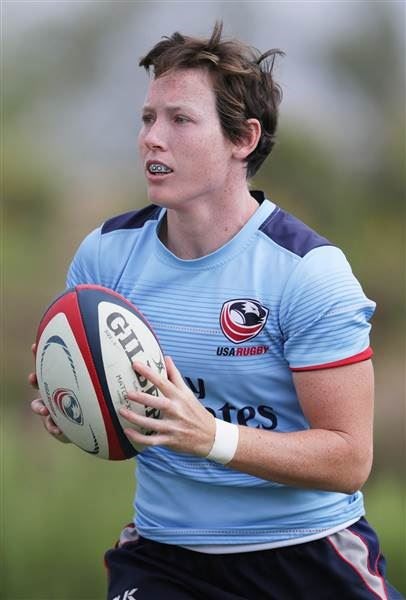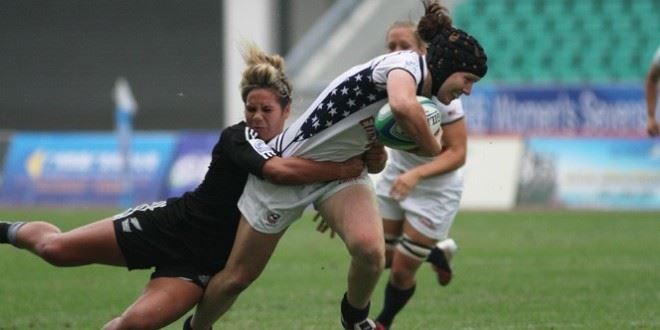" I don't care what the odds are. I'm going to get through this one way or another."
 Jillion Potterwww.today.comMany Olympians faced demanding trials in order to compete, but their resilience through struggles is what gave them olympic strength. U.S. olympic rugby player Jillion Potter had to tackle both people and cancer to get to the games. After joining the sport at college in 2005, Potter was elevated to the national team just a few months later. However, right before her World Cup debut in 2010, she broke her neck and was told that she would never play rugby again. She defied this prognosis and was back on the field a year later. But in 2014, she was told for a second time that she would never play again, or possibly live: she had Stage 3 Synovial Sarcoma, a tissue cancer with a 50% survival rate. Potter refused to fall into the statistics, and never let cancer overshadow her dreams of playing on the U.S Olympic team in 2016. She fought hard and trained harder, eventually beating cancer and captaining the first ever United States women’s rugby team at the 2016 Rio Olympics. Throughout her career, Potter managed to overcome all odds by using principles from the sport she loved: positivity and diligence. Through optimism and perseverance, Jillion Potter shows that it is possible to achieve even olympic sized dreams after major setbacks.
Jillion Potterwww.today.comMany Olympians faced demanding trials in order to compete, but their resilience through struggles is what gave them olympic strength. U.S. olympic rugby player Jillion Potter had to tackle both people and cancer to get to the games. After joining the sport at college in 2005, Potter was elevated to the national team just a few months later. However, right before her World Cup debut in 2010, she broke her neck and was told that she would never play rugby again. She defied this prognosis and was back on the field a year later. But in 2014, she was told for a second time that she would never play again, or possibly live: she had Stage 3 Synovial Sarcoma, a tissue cancer with a 50% survival rate. Potter refused to fall into the statistics, and never let cancer overshadow her dreams of playing on the U.S Olympic team in 2016. She fought hard and trained harder, eventually beating cancer and captaining the first ever United States women’s rugby team at the 2016 Rio Olympics. Throughout her career, Potter managed to overcome all odds by using principles from the sport she loved: positivity and diligence. Through optimism and perseverance, Jillion Potter shows that it is possible to achieve even olympic sized dreams after major setbacks.
Potter showed strength and optimism no matter the circumstance. Potter had already proven physical strength time and time again out on the rugby field, but also demonstrated mental strength when forced to deal with the emotional weight of cancer: “‘I learned from my broken neck that you need to control only what you can and you must stay in the present,” Potter says. ‘I would look at the faces of people who were with me, Carol especially, and realize how beautiful they were and how lucky I was to have them in my life. I took in the moments that I had and told those close to me that I loved them. There was beauty in my life even as I was battling this terrible cancer. I saw that. And if I was going to die, so be it. But I was going to spend my last moments cherishing love’”(Anderson). Potter had scored a try when it came to life. She had broken barriers as a lesbian athlete. She found love. She played on one of the top women’s rugby teams in the world. She had lived a life she was proud of, so if she died, she would die proud. She chose to be optimistic about her situation, rather than dwell on it. Along with this principle, Potter also centered on the idea of rising after hardships: “Because here’s the thing: Bad things—unexpected things—happen, even to people who feel like they’re on top of the world. Life doesn’t just happen when you’re on top. It happens when you’re at the bottom of the mountain, too. When you are dusty and scraped up and tearful and scared, life is happening there, too. And if you spend too much time looking back up at where you used to be, you’ll miss all the beauty and clarity that can come with being knocked down”(Potter). Potter had been knocked down. So what? Neither life or rugby would stop just because she fell. She may have been better before, but now she could find new light in her situation. New motivation. New lessons that could help her get back up again. She used optimism in order to find a new outlook to inspire her to keep going. By practicing positivity, Potter found reason to keep going on.
 Potter breaks through a tacklewww.americasrugbynews.comPotter demonstrated perseverance during treatment, never letting cancer shadow her dreams of competing in the Olympics. While in chemotherapy, Potter used lessons learned from the rugby field to motivate her to continue on: “‘In rugby, one of the biggest things you learn is resilience and persistence and getting knocked down in a tackle and having to get back up and support your teammates and play the game,’ she said. ‘It’s the same in life’”(Cancer Survivor). Potter was going to deal with life the same way she was going to on a tackle: with aggression. No matter what, she would go into life’s challenges with the same intensity as she would on a rugby field. She would not back down, she would finish the game strong. Potter was also determined to do whatever it took to get her Olympic spot, even if it physically drained her: “If a doctor told Potter to drink 17 glasses of water one day, she would make sure to gulp down 20, no matter how godawful it made her feel. Told to take it easy on her off days from chemo, Potter trained like her spot on the Olympic team was on the line, lifting weights and running to the point of total exhaustion and physical collapse” (Anderson). Potter refused to be defined as just a cancer patient. She was also going to be an Olympian and powered through the same exercises her teammates were doing, even though it only added more pain due to her treatment. Synovial Sarcoma is a tissue cancer, so while the cancer cells were being killed by the chemo, healthy cells all over her body were too. Yet even though her body was pretty much falling apart, she continued to do high-intensity training. She wouldn’t let anything get in between her and her passion. With her discipline, Potter managed to make to make the Olympic team, a feat many healthy professionals couldn’t do. Potter illustrated that with perseverance, goals are still attainable after facing setbacks.
Potter breaks through a tacklewww.americasrugbynews.comPotter demonstrated perseverance during treatment, never letting cancer shadow her dreams of competing in the Olympics. While in chemotherapy, Potter used lessons learned from the rugby field to motivate her to continue on: “‘In rugby, one of the biggest things you learn is resilience and persistence and getting knocked down in a tackle and having to get back up and support your teammates and play the game,’ she said. ‘It’s the same in life’”(Cancer Survivor). Potter was going to deal with life the same way she was going to on a tackle: with aggression. No matter what, she would go into life’s challenges with the same intensity as she would on a rugby field. She would not back down, she would finish the game strong. Potter was also determined to do whatever it took to get her Olympic spot, even if it physically drained her: “If a doctor told Potter to drink 17 glasses of water one day, she would make sure to gulp down 20, no matter how godawful it made her feel. Told to take it easy on her off days from chemo, Potter trained like her spot on the Olympic team was on the line, lifting weights and running to the point of total exhaustion and physical collapse” (Anderson). Potter refused to be defined as just a cancer patient. She was also going to be an Olympian and powered through the same exercises her teammates were doing, even though it only added more pain due to her treatment. Synovial Sarcoma is a tissue cancer, so while the cancer cells were being killed by the chemo, healthy cells all over her body were too. Yet even though her body was pretty much falling apart, she continued to do high-intensity training. She wouldn’t let anything get in between her and her passion. With her discipline, Potter managed to make to make the Olympic team, a feat many healthy professionals couldn’t do. Potter illustrated that with perseverance, goals are still attainable after facing setbacks.
 Potter (third from top left) with teammates at the 2016 Rio Olympics www.nbcsports.comJillion Potter demonstrated that even after misfortune, it is still possible to achieve goals as long as they are viewed with a persistent and optimistic mindset. Potter’s perspective on cancer was that it was only a tackle, and it wasn’t strong enough to keep her from getting up and playing on. She didn’t consider it a setback, she considered it motivation. It wouldn’t define her, but it would fuel her to her dreams and beyond. Her trials were difficult, however her discipline and determination would triumph: "I always had my sights on coming back, but I also had to remind myself to be patient going through those ups and downs of where I'm at and just being OK with it" (Axon). Potter realized that progress is still progress no matter how little it may be. Even if the beginning is a little slow, it is still possible to get to the end goal. The Olympics broadcasted Jillion Potter’s resilience and optimism to girls all around the world. She has shown us that we can be tough. She has shown us that we can excel in a male-dominated field. She has shown us that it is important to get up, and not let obstacles take us down for good. Even though our battles may not be as big as hers, her journey has inspired us to stand up, and face challenges with a smile.
Potter (third from top left) with teammates at the 2016 Rio Olympics www.nbcsports.comJillion Potter demonstrated that even after misfortune, it is still possible to achieve goals as long as they are viewed with a persistent and optimistic mindset. Potter’s perspective on cancer was that it was only a tackle, and it wasn’t strong enough to keep her from getting up and playing on. She didn’t consider it a setback, she considered it motivation. It wouldn’t define her, but it would fuel her to her dreams and beyond. Her trials were difficult, however her discipline and determination would triumph: "I always had my sights on coming back, but I also had to remind myself to be patient going through those ups and downs of where I'm at and just being OK with it" (Axon). Potter realized that progress is still progress no matter how little it may be. Even if the beginning is a little slow, it is still possible to get to the end goal. The Olympics broadcasted Jillion Potter’s resilience and optimism to girls all around the world. She has shown us that we can be tough. She has shown us that we can excel in a male-dominated field. She has shown us that it is important to get up, and not let obstacles take us down for good. Even though our battles may not be as big as hers, her journey has inspired us to stand up, and face challenges with a smile.
Works Cited
Anderson, Lars. “U.S. Rugby 7s 'Enforcer' Jillion Potter Is the Only Help You'd Need in a Rumble.” Bleacher Report, Bleacher Report, 7 Apr. 2017, bleacherreport.com/articles/2654564-us-rugby-7s-enforcer-jillion-potter-is-the-only-help-youd-need-in-a-rumble.
Associated Press. “Cancer Survivor Jillion Potter Inspires U.S. Teammates.” NBC Olympics, 7 Aug. 2016, www.nbcolympics.com/news/cancer-survivor-jillion-potter-inspires-us-teammates.
Axon, Rachel. "Potter reaches goal after battling cancer." USA Today, 5 Aug. 2016, p. 05D. Biography In Context, https://link.galegroup.com/apps/doc/A460074650/BIC?u=powa9245&sid=BIC&xid=f66a4df8. Accessed 9 May 2018.
Potter, Jillion. “What No One Tells You About Getting Cancer.” Time, Time, 15 June 2016, time.com/4363107/what-no-one-tells-you-about-cancer/.
Page created on 5/24/2018 6:29:38 PM
Last edited 5/25/2018 7:10:27 PM
